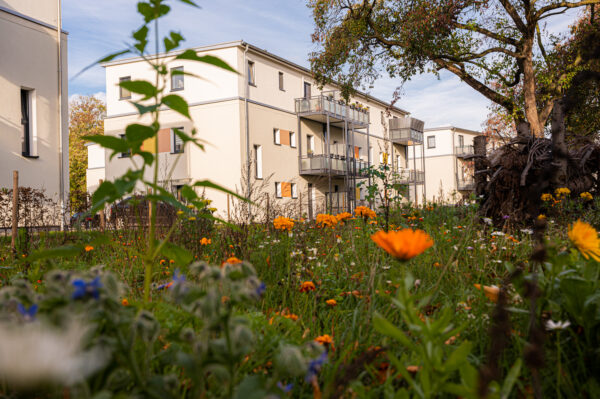Environment and Climate
GRI
2-23
2-24
2-25
3-3
201-2
302-4
302-5
305-1
305-2
305-3
305-4
305-5
UNGC
Principle 1,
Principle 7,
Principle 8,
Principle 9
SASB
IF-RE-130a.1
Disclosure
Climate change and resource shortages are not abstract future problems. They are already clearly noticeable in all regions of the world. The mitigation of global warming and the protection of natural resources for life on earth are some of the most important challenges facing society as a whole in our time. Corresponding agreements have been made and specific targets set all around the world. These include, at international level, the Paris Agreement and the European Union Green Deal, and at national level, such as the goal set for Germany by the Federal Government this year to achieve climate neutrality by 2045. At the same time, there is a constant demand for new homes – the German government has set a target of 400,000 new homes each year.
The real estate industry has an important part to play in tackling these tasks. The construction and operation of residential properties causes a large amount of greenhouse gases, directly and indirectly, and consumes considerable resources. As the housing industry market leader in Europe, we aim to be a central driving force behind climate and environmental protection. With a portfolio of more than 550,000 residential units in Germany, Austria and Sweden and its involvement in a number of wide-ranging development activities, Vonovia has a significant role to play in protecting our environment and mitigating climate change in the industry.
- Climate path confirmed incl. Deutsche Wohnen; alignment with Paris targets confirmed externally
- Carbon intensity in Germany improved from 38.4 to 33.0 kg CO2e/m2
- Development of Climate risk tool for analyzing physical climate risks
- Launch of heat pump initiative with more than 100 buildings in Dortmund
- Average primary energy demand of new constructions reduced by more than 2% to 37.7 kWh/m2 per year
- More than 98% of new buildings completed in Germany are in energy efficiency class A or A+
- Cross-sector dialogue process "Perspectives on the Future of Construction"
- Embedded carbon emissions determined for completed new constructions
- Modular wood construction strengthened by strategic cooperation with GROPYUS AG
Maintaining and promoting biodiversity in the residential environment is also important to us in addition to protecting the climate. As a residential real estate company, we believe it is our job to make a positive contribution to biodiversity and environmental protection.
One vital aspect of our everyday work is a conscientious and careful attitude toward the use of resources and – wherever possible – reusing and recycling materials and products.
Our activities are impacted heavily by economic and legal conditions. These can change abruptly in some cases. Currently, the economic environment is dominated by changes in interest rates and the rising cost of construction and materials. Other factors include the form that building efficiency standards take, the associated public authority subsidy conditions, the breakdown of the CO2 price on fossil fuels between tenants and landlords, and the legal measures to restructure the electricity and heating sectors.
We are also observing growing demand for sustainable investment opportunities and products on the financial markets. Financial institutes are being pushed by regulators to ensure more transparency regarding the sustainability of their asset portfolios and, like companies in the industrial sectors, report in accordance with the EU Taxonomy. The analysis of long-term developments and their impacts on the business model is also growing in importance (see Implementation of the TCFD Recommendations).
During the merger of Vonovia’s and Deutsche Wohnen’s materiality analyses, we combined a number of action areas and redefined topics in our sustainability reporting. The Environment and Climate action area consists of two material topics: Reducing CO2 in the Housing Portfolio and Sustainable Construction and Refurbishment. Other important topics include Sustainable Materials and Products, Protecting Biodiversity, Water, Effluents and Waste and Resource and Climate Protection in Business Operations.


